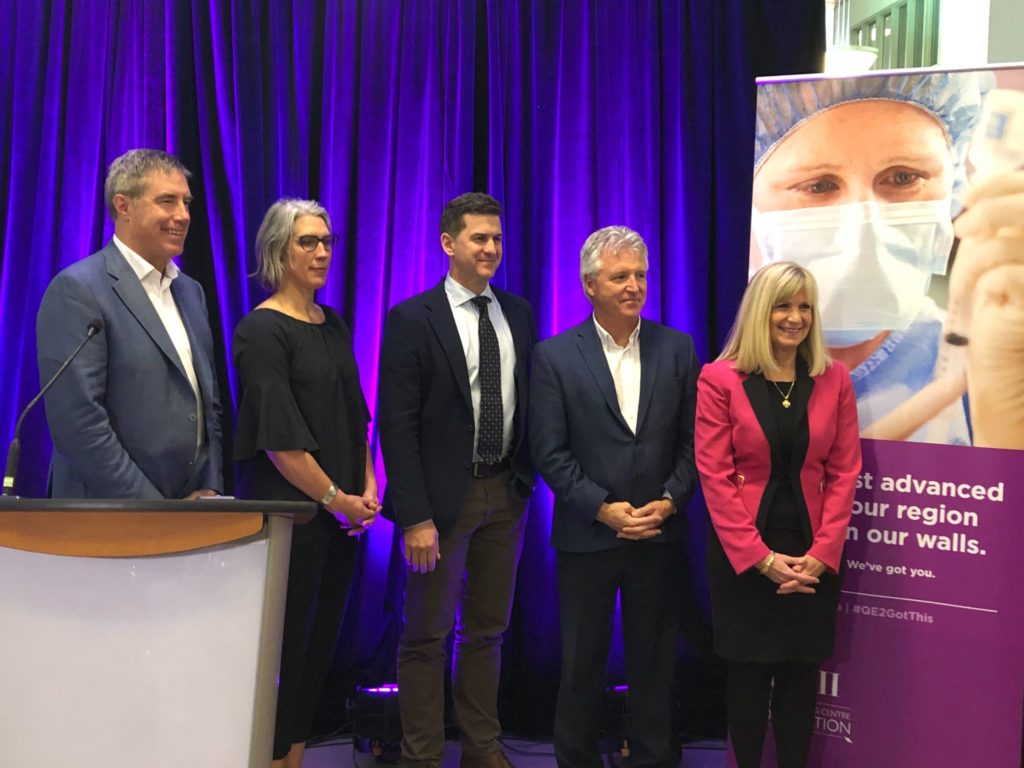
December 2, 2019
In today’s ever-evolving world, rapid advancements in technology are improving, and enhancing, almost every aspect of our daily lives – from how we get our news, to how we drive our cars, to how we watch TV and movies, and so much more.
Now for Nova Scotians, technology is changing their lives once more – but this time it’s in the medical field. Just recently, it was announced that Nova Scotia’s QEII Health Science Centre is now home to Atlantic Canada’s first surgical robotics technology!
Robot-assisted surgery is an innovative solution that many medical centres in large cities are using across Canada as an effective tool to help treat some forms of cancer. Here in Halifax, the QEII has had the opportunity to trial robot-assisted surgery since February 2019, for the treatment of prostate, gynecological, and kidney cancer.
In the 10 months since they’ve had it, surgeons at the QEII have performed nearly 100 robotics procedures with the technology, including more than 40 prostatectomies, 30 hysterectomies, and 14 partial kidney removals. From these procedures, surgical teams at the QEII are already seeing patient benefits from this innovated medical technology, including:
- Faster healing, and recovery, times
- Fewer post-operative complications and less risk or infection
- Reduced pain, and reduced reliance on opioids to manage pain
- Less impact to delicate nerves within prostate cancer patients
- The ability to operate on patients who weren’t previously candidates for minimally invasive surgeries
One DNS member who got to contribute to this project was Rose Wagner and her team, of Rose Wagner Media, who worked with the QEII Foundation on the delivery of this announcement. Rose Wagner Media is a full-service media agency that works with clients to discover the most effective methods that they can use to generate awareness to their campaign and their messages, while also saving costs.
[fusion_imageframe image_id=”57650|full” max_width=”250px” style_type=”” blur=”” stylecolor=”” hover_type=”none” bordersize=”” bordercolor=”” borderradius=”” align=”left” lightbox=”no” gallery_id=”” lightbox_image=”” lightbox_image_id=”” alt=”” link=”” linktarget=”_self” hide_on_mobile=”small-visibility,medium-visibility,large-visibility” class=”” id=”” animation_type=”” animation_direction=”left” animation_speed=”0.3″ animation_offset=””]https://digitalnovascotia.com/wp-content/uploads/2019/12/Image-from-iOS-44-scaled.jpg[/fusion_imageframe]
Rose Wagner Media worked with the QEII Foundation to assist with their communications and promotional efforts for this project. In this role, the team provided insightful and research-driven, reasons to which media channels the Foundation should use to reach their target audience, what tactics would be most effective, which media channel would provide the highest return on investment, and much more. Additionally, they worked with established media partners (such as CBC, CTV, etc.) to get coverage and draw more awareness towards the project.
The QEII’s new surgical robotics technology has already garnered attention for Halifax in the medical world, as the tech has played an integral role in the successful recruitment of four new, highly trained, surgeons to the area. One of which is Nova Scotia’s own Dr. Ross Mason.
Dr. Mason is a urologist, who specialized in robot-assisted surgery while completing a fellowship in urologic oncology at the Mayo Clinic in the United States. For him, the opportunity to continue to work in robot-assisted surgery, while also being able to go back home, was too perfect to pass up. Dr. Mason believes this tech will lead to other talented surgeons coming to Halifax in the near future to compliment our current brilliant surgeons.
“Most surgeons who specialize in complex, cancer surgeries are now being heavily trained in robotics. They’ve got the skills and they want to use them, so they’ll be more attracted to centres where they’re able to offer that.”
As mentioned earlier, the robot-assisted tech was first made available in the QEII in February 2019 on a trial basis. The trial was made possible by QEII Foundation donors, who have donated $5.3 million to-date towards the Foundation’s $8.1 million fundraising goal for the project. The QEII Foundation is funding the entire surgical robotics project, including raising the remaining $2.8 million of their goal to keep the tech long-term, and to expand its use to other cancer surgeries at the QEII.
We’re proud to have this technology here in our healthcare system and proud to see Nova Scotian companies like Rose Wagner Media having such a huge impact on our community. The awareness of this initiative will help drive the remaining funds needed for long-term success! Congratulations to all involved!
